‘I spent $20,000 of my parents’ money on mystery boxes’: When lines between gaming and gambling are blurred
Mystery or loot boxes appear in many online games — could they turn a teenager’s love for gaming into a gambling addiction? Here are young gamers’ disturbing stories, and tips for what parents and gamers can do.
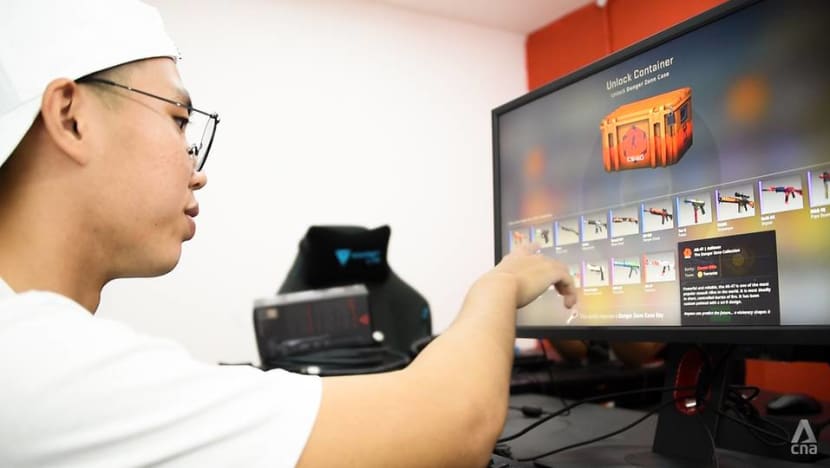
A Counter-Strike: Global Offensive loot box with in-game weapons of varying rarity.
SINGAPORE: You’re a teenager with S$50 to spare, and rather than clothes or gadgets for yourself, you decide to spend on your favourite online game — specifically, your character or avatar.
You could buy a fancy costume or sword. But you choose loot boxes instead, which contain random items of varying rarity depending on your luck.
You might get something worth, say, 10 times more than the few dollars you paid. But most boxes come up empty or contain common items — and you buy one after another, until finally you win something. Your screen explodes with virtual fireworks. It feels like winning the lottery.
So you do it again and again — hooked on the pursuit of big prizes. It’s an all-too-familiar scenario for gamers like Jasman Choo.
At 15, he started playing Team Fortress 2 every day. The game rewarded him with mystery ‘crates’ as he played, and he bought ‘keys’ worth US$2.49 (S$3.35) from the in-game store to open them.
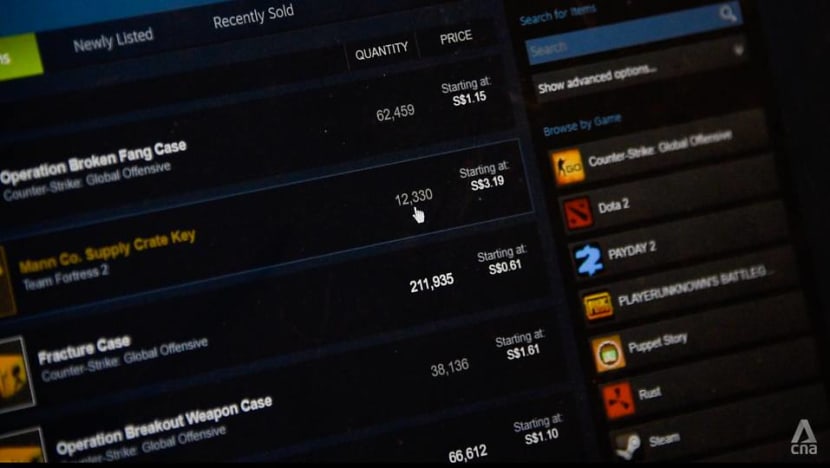
He estimates he must have opened over 250 crates, each time finding items inside that were worth around US$3 to US$5 — meagre by gamers’ standards.
“I kept thinking the next one would be ‘the one’, since I did not get anything (valuable) in the previous 50 crates, 100 crates, 150 crates,” he said. “But it never happened.”
Then he chanced upon a third-party website — one that let him bet his in-game items on games like roulette, with a chance to “double or triple” the items’ value.
“I started off with (putting in) a S$5 item, then after about 30 minutes it became S$200,” Jasman said. “I kept winning, winning, winning.”
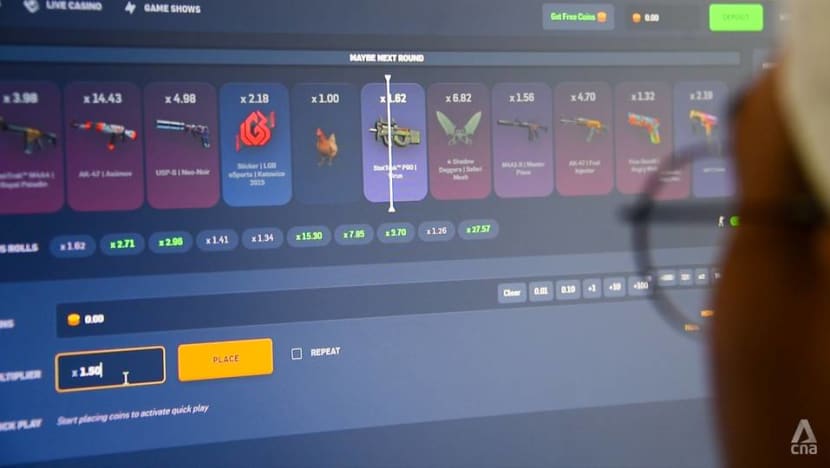
What made it easier to throw caution to the wind was that these games didn’t involve actual cash, “just pixels on the screen”.
READ: From playing in arcades and a one-room flat, to top of the world
GONE IN 30 SECONDS
But then came the time he lost real-world money.
He had moved on to playing Dota 2 by then, and had just bought a S$200 “skin” (the term for a cosmetic item like a character’s costume) from a friend. “The first thing I thought of was the third-party website,” he said. “All I remembered was how easy it was to double whatever I put in.”
Indeed, he won at first — that S$200 value became S$1,800 that he could trade for game items.
The one item he really wanted, however, cost S$2,000. So he came up with a plan to reach that target — instead of betting everything on one roll of the dice so to speak, he thought he’d be smart and trade in for four items of smaller value, that he could bet one by one.
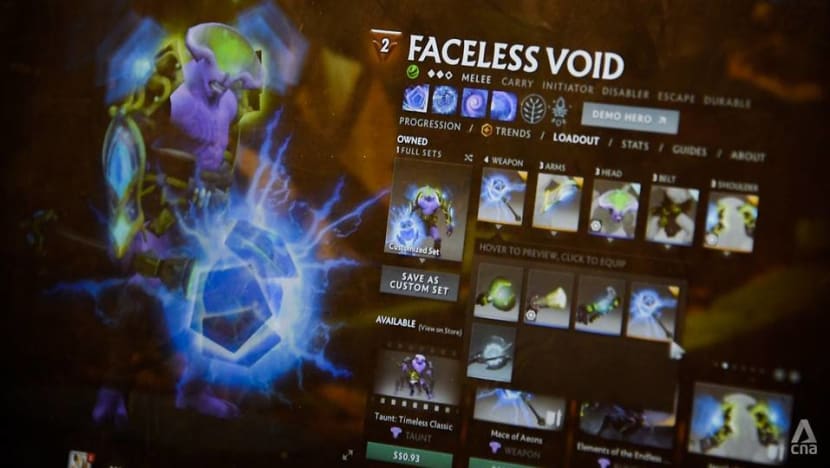
But, “I lost on the first three,” recounted Jasman, now 24. “When it came down to the final item, I thought: There’s no way I can lose four times in a row. So I put it in — and it was gone.”
He could have stopped there, with only virtual losses. But “I was so triggered, I went to buy an item that cost S$1,000, and I gambled it all in one shot. It was gone in 30 seconds.”
In one night, he’d lost a small fortune in real, hard cash.
Jasman’s story is just the tip of the iceberg. Another Singaporean young gamer, who spoke to CNA Insider on condition of anonymity, told of how he’d racked up some S$20,000 on his parents’ mobile phone bills mostly from buying loot boxes.
WATCH: How loot boxes can turn gamers into gamblers (11:47)
The addiction got so bad that he once even stole money to help pay for the bills. He eventually stopped cold turkey and sold off his three gaming accounts for about US$100 each — “less than 5 per cent of the actual total I’d spent gaming”, he said.
‘IT SEEMS SO INNOCENT’
The insidious dangers of loot boxes and the link to gambling addiction has been a growing worry worldwide, with Belgium outlawing loot boxes altogether, the Netherlands banning some types, and others like China and Japan enacting regulation.
But few gamers start off opening loot boxes aware of the rabbit hole they could fall into.
“The opening of loot boxes seems so innocent. It doesn’t look like gambling at all,” said Jasman. “It looks like opening a present.”
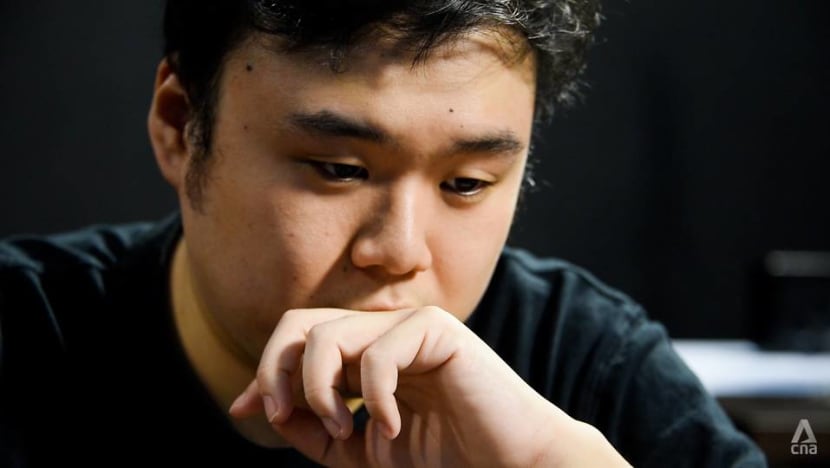
Game-makers incorporate concepts from the gambling world to “make their games addictive” — they “condition” gamers the same way that a jackpot machine prize evokes “a sense of excitement”, said Yeo Hui Teng, a social worker with Fei Yue Community Services.
She pointed out that the use of in-game currency is also a “psychological trick that game-makers use to create a buffer, so that you don’t realise how much money you are actually spending”.
There are other mindgames at play.
Raja Khairulanwar, 29, used to play a Genshin Impact, a ‘gacha’ game (another term for games with loot box features) that “encourages you to keep gacha-ing for a chance to get rare and powerful characters”.
The base odds of getting a super-rare box are 0.6 per cent, but this does not deter players. And many gacha games purposely offer limited-time-only items to “work on your fear of missing out”, he added.
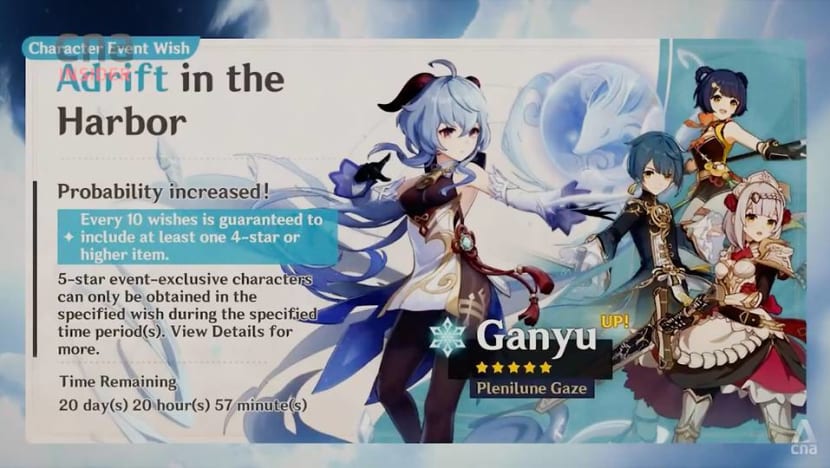
Then there is the peer pressure — cited by several gamers — when playing with friends, to try to obtain a certain skin for one’s character to “fit in” with how everyone else looks.
That’s when one might turn to the third-party websites that entice gamers to trade in skins, wager them on esports, or gamble them on casino-type games.
Because players draw their ‘earnings’ as virtual game items rather than cash at many of these websites, they fall in a grey area not covered by anti-gambling laws.
But what starts out seeming relatively harmless could lead to something that is not.

“Our concern is that these gamers are very young, and this might end up normalising gambling for them,” said Nicholas Khoo, founder of the Singapore Cybersports and Online Gaming Association and a member of the National Council on Problem Gambling (NCPG).
And the more favourable odds offered in some of these social casino games “may give the false perception that if you took part in real gambling, you might end up winning”.
READ: Alien language? Shoutcasters like Daryl Lim are the voices of e-sports tournaments
THE LINE BETWEEN LOVE AND ADDICTION
One warning sign that gambling within a game could become a larger, uncontrollable problem like addiction, is when one loses control of how much time and money one spends on games “at the expense of other things” — such as eating, sleeping and studying, said Hui Teng.
Developing strong feelings for one’s in-game characters is another warning sign. In Genshin Impact, said Raja, “they make you feel for the characters by making you part of the story, then they slowly push you to the gacha mechanics”.
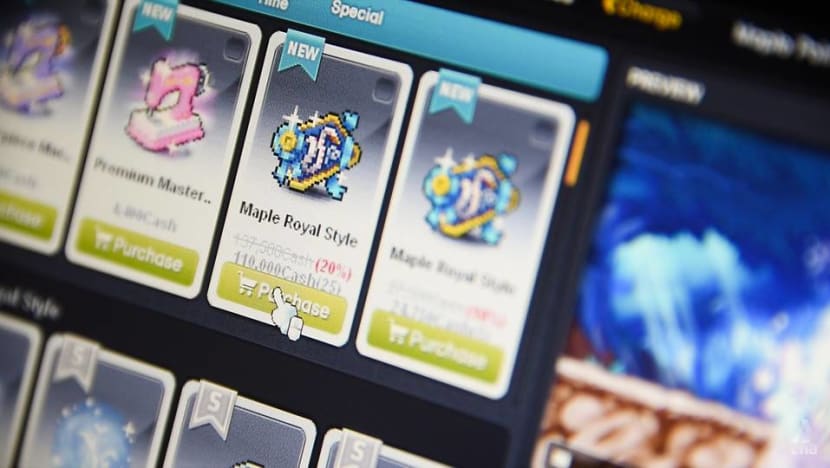
“These games have very cute or handsome characters. By getting you so invested, you’re willing to spend your money just for a chance to build the image of your perfect guy or girl,” he added.
A third warning sign is when chasing the endorphin thrill of finding out what’s inside a loot box supersedes the reward itself.
Ryan Tan, 19, whose first encounter with loot boxes was in Counter-Strike: Global Offensive seven years ago, reckons: “I would have spent more than S$1,000 (on them). Maybe I only got back S$200 worth of skins? That’s a net loss of about S$800.
“The chances of getting a good skin or making a profit are low — but the thrill makes me want to try again.”
One explanation for this is selective amnesia, noted Raja. The feeling of being “at your lowest low” when you’ve lost is usually temporary, he said; once you recover, you’re ready and raring to go again.
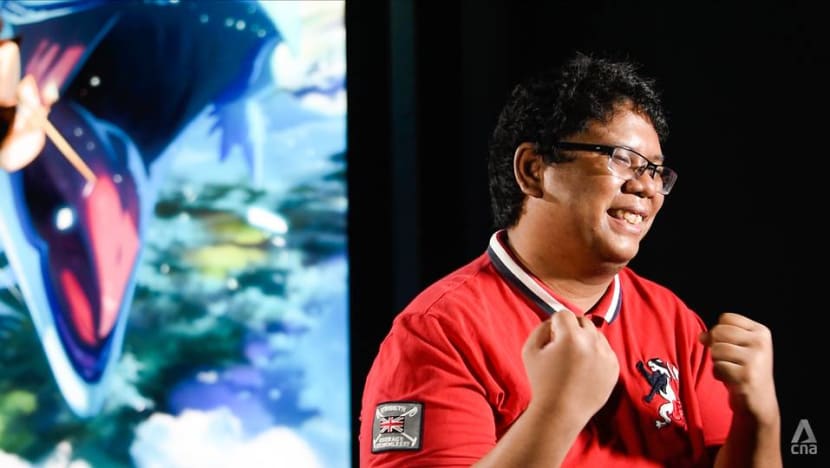
REAL-WORLD CONSEQUENCES
For undergraduate Jen Tan, 23, an online role-playing game became her escape from real life, including when she had depression. “I would just play MapleStory instead of going to school,” she said.
“My daily tasks were things I needed to do in the game. And when I talked to people in the game, that was my social interaction. You get all your fulfilment online.”
That fulfilment included gacha rewards. In the game, players buy gachapon tickets to exchange for randomised items. Jen once spent so much on these that she had “zero dollars” in her bank account — “I had to borrow money from my boyfriend to eat”.
READ: From livestreaming to e-sports: Witness the rise of female gamers in Singapore
Once gamers find themselves trapped in a compulsive cycle of opening mystery boxes, some might even land themselves in debt. As Hui Teng noted: “You’ve already spent so much time and energy on this game. You don’t want to give it up, even though it might be causing you harm.”

The long-term effects are harder to pin down. A number of gamers told CNA they had not gone on to try real-world gambling. But Jasman says his wagering habit has carried over to other areas of his life as he’s grown up.
“Now it’s reached a point where I just love taking monetary risks. Having money and not doing anything is so ‘stagnant’. I just have this need to do something with it, be it gambling or buying bitcoin,” he said.
“It’s hard to blame the game, but it kind of started the habit.”
CURBING THE ADDICTION
What can parents do if they recognise any of the signs above in their teenagers who are into online games?
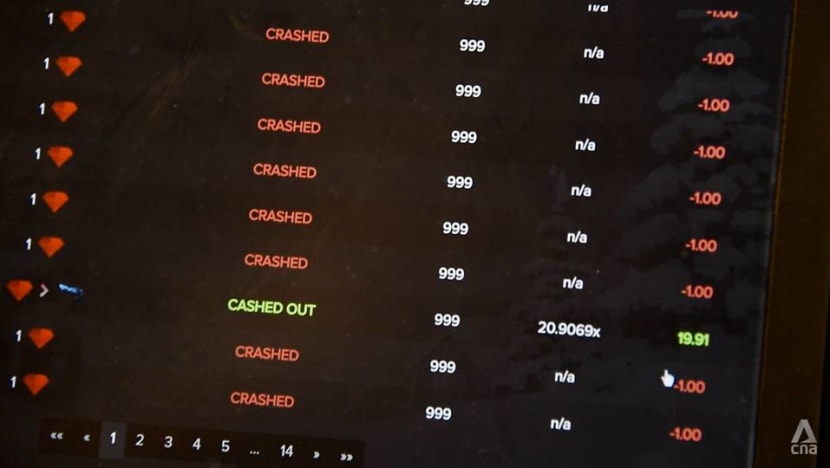
First — take time to understand why their child loves the game and how it works, even if parents “might not agree with it”, says Hui Teng, rather than just tell them to stop.
Having that understanding will “open up conversations and allow them to work something out with the child,” such as setting reasonable time or spending limits, she said. “Gaming and spending money in games in itself isn’t a bad thing … Where we draw the line is when it gets out of control.”
Nicholas, a father of four, likewise urges parents to play the games with their child.
If these “advocate a certain activity that you may not agree with, you’re there to see it for yourself, and to point it out and help your kid along”, he said. Parents can also use filter software tools, he added.

Secondly, parents should identify if their child is using games to meet some real-life need — then help them with that. “Parents, teachers, they are all the first line of defence,” said Hui Teng.
Youths who need help can also be referred to eC2, a text-based online counselling platform run by para-counsellors from Fei Yue Community Services.
At a national level, said Nicholas, NCPG has observed “a number of countries” strengthening their industry regulation — such as South Korea and China, which have made game developers disclose the odds in their loot boxes.
One game developer believes that industry players can work with their community to ensure loot boxes aren’t “predatory”.
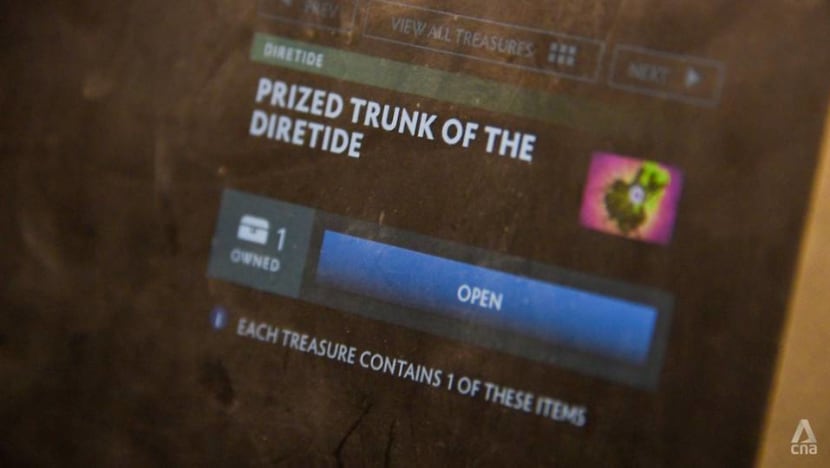
What makes a loot box “predatory” is when there’s “no end in sight” to how much the player spends to get the desired item, said Justin Hulog, Riot Games Southeast Asia’s general manager.
The counter to that is an option for players to buy a loot box item outright — an idea that was, in fact, suggested to the company by gamers; or to set a time limit by which players “will definitely” get the sought-after item.
He also noted: “Riot Games works to collectively implement things like anti-addiction timers in the games all over Southeast Asia in high-regulation environments such as Korea, China and Vietnam, which have strict anti-addiction laws.”
Still, some gamers believe that kicking the addiction has to boil down to one’s own self-control and discipline.
“If you just take down this website, another website will come out. You need to change your own habits,” said Ryan, who picked up regular exercise to curb his gaming addiction. “People say to cut off bad habits, you need to replace them with a good habit.”

As Jasman put it: “It’s so easy to fall into the trap of putting in a bit more money to try to get back what you lost. It’s not easy to quit.
“On the other hand, who will stop when they’re winning? So if you don’t stop when you’re winning, and you don’t stop when you’re losing — when do you stop?”
Where to get help:
ec2.sg
Fei Yue Community Services online counselling
1800-377-2252 and touch.org.sg
TOUCHLine (Counselling)
betterinternet.sg
Media Literacy Council
This article by CNA Insider was done in collaboration with the National Council on Problem Gambling.

















